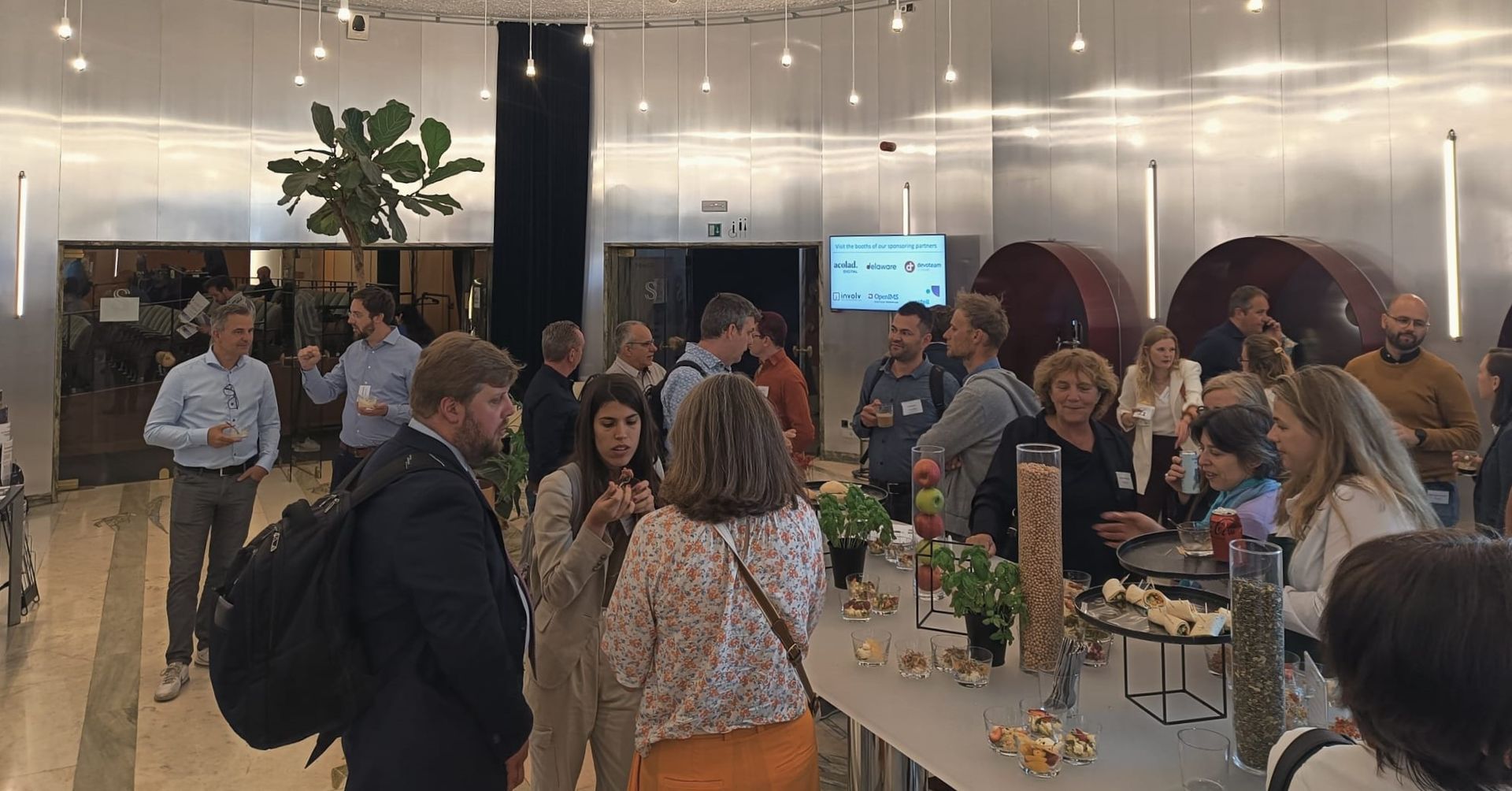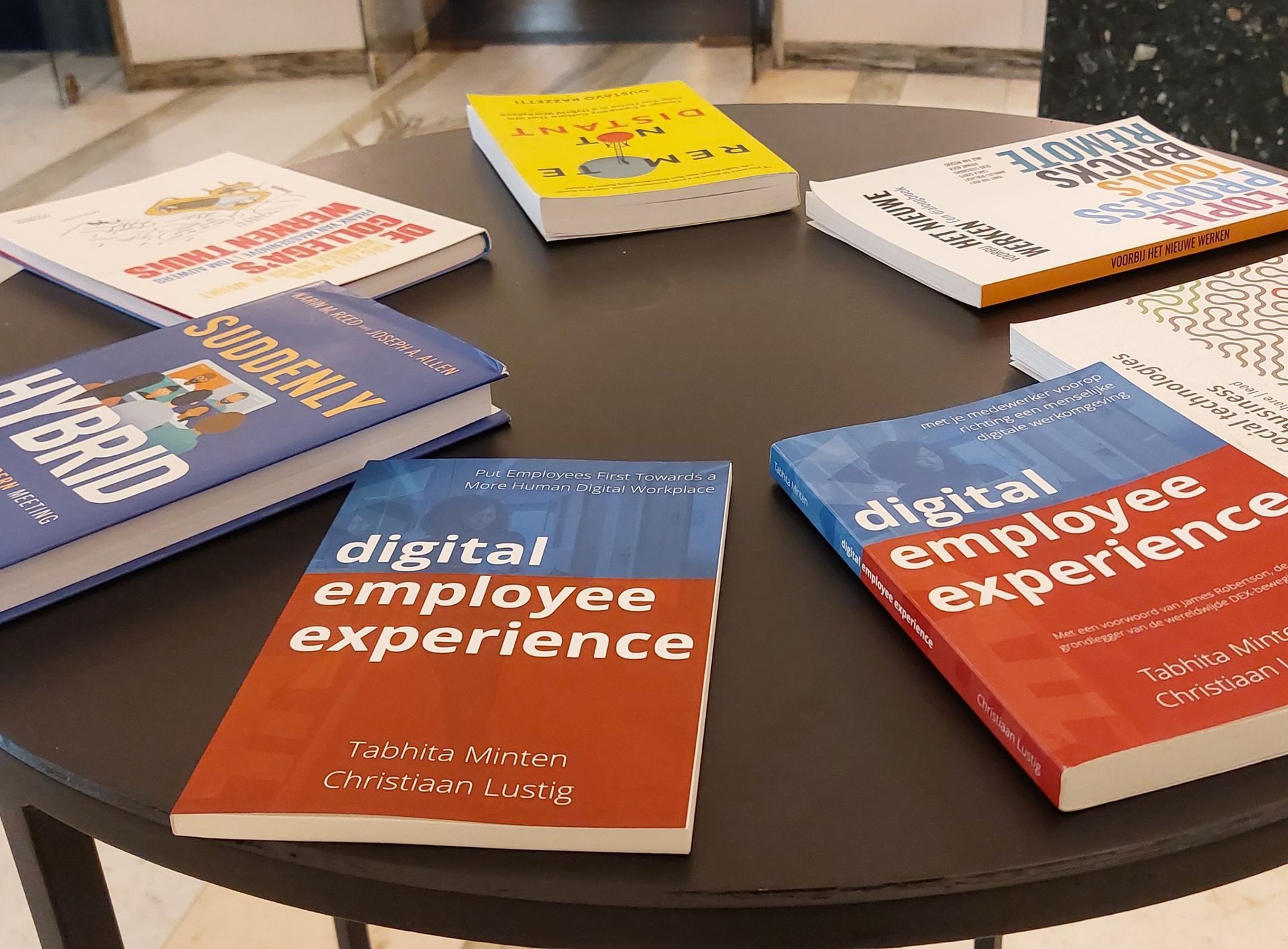Four intranet & digital workplace trends from the #dwbrussels conference
28 August 2023 - by Guy Van Leemput
On June 1st 2023, around 100 intranet and digital workplace professionals gathered in Brussels and online for already the 6th edition of the Brussels Digital Workplace Conference. As in previous years, the conference attracted a varied audience of leaders and experts from Internal Communication, HR and IT to hear keynote speakers, explore case studies and participate in panel discussions.
As always, the #dwbrussels conference offers a prime opportunity to discover and debate new trends. Here are four key intranet and digital workplace trends for 2023 and beyond that I picked up:
1. Hybrid work is the new normal
From the presentations and discussions during the day, it is clear that many organisations have experimented over the past few years with different flavours of hybrid and asynchronous work.
Out of desire or necessity due to the nature of the business, some have gone further than others towards either full-online or full-onsite. Opening keynote speaker Jan Nieuweboer from Rabobank talked about ‘digital first’ as one of the three guiding principles of their Rabo@Anywhere framework: Digital working is the starting point, in addition to days when employees consciously choose to go to a RaboHouse for their work. Other companies may choose different approaches and implement some other flavour of what is often called ‘structured hybrid work’ – a good example is the recent announcement by Zoom to order workers back to the office two days per week.
Several speakers at the conference focused on one key enabler to make hybrid work successful: asynchronous communication. Pilar Orti, well known for her podcast ‘21st century work life’, shared a useful set of 5 principles to make asynchronous work a success. Isabel De Clercq focused on finding the right balance between synchronous and asynchronous communication, which will vary by team and by industry.
And just when we thought we had it all figured out, closing plenary speaker Koen Blanquart challenged the concept of hybrid work altogether. Using the metaphor of the hybrid car, which is only an intermediate solution towards fully electric, he claimed that hybrid work is a temporary stage on the road to fully remote work. He made a compelling case but hasn’t convinced me – it may take a while to get hybrid work right, but in my view it’s here to stay.
-
City skyline
ButtonClosing keynote speaker Koen Blanquart challenged the audience to think differently about hybrid and remote work.
-
City skyline
ButtonBooks available for browsing at the conference
2. Cross-functional teams are key to success
While traditional intranets in the past were typically owned by one specific department, most often IT or Internal Comms, today this is no longer the case. Successful digital workplace projects are delivered by cross-functional teams consisting of Internal Communications, HR, IT and Facilities Management. This was the case at Rabobank but also in other case studies that were presented at the conference.
Especially the role played by HR in these cross-functional projects has grown in significance. Typical HR topics such as employee well-being and engagement are getting more attention. Several speakers at the conference focused on these areas: Christiaan Lustig presented his framework for happy and productive employees, while Hans Demeyer focused on the levels of digital comfort versus digital stress among employees.
Several people used the term ‘de-siloing of HR’ at the conference, which I think summarises it well. I’m convinced that HR needs to be a major stakeholder in any intranet or digital workplace project, with a particular focus on the overall employee experience of what gets delivered.
3. Invest in employee listening
Several speakers stressed the importance of employee listening as a key success factor in today’s workplace. This can be done through surveys, like at Rabobank, but also by allowing comments on articles, by setting up discussion groups in Viva Engage, etc. The days of strictly controlled top-down communication are long gone, and successful companies encourage bottom-up contributions – and act upon them! Tools such as Microsoft Viva Glint (company-wide engagement surveys) and Viva Pulse (feedback tool) were presented at the conference – two new kids on the block in the ever-expanding Microsoft Viva family.
4. And one more thing: Generative AI
2023 is the breakthrough year for generative AI, and the subject was hotly debated at the conference. One of the breakout sessions featured a real-life case study presented by Ivan Westerhof, COO and Managing Partner of the Brussels-based startup Campfire AI. On the other side of the spectrum, Microsoft’s plans with AI were discussed during the plenary presentation of Ine Princen (Microsoft) and Benny Van de Velde (Managing Partner at The Flow). They showed the audience some of the impressive capabilities of Microsoft Copilot, which is embedded into the various Microsoft 365 apps. At the time of the conference, pricing for Copilot was not yet announced – since then, the steep license cost has somewhat dampened the initial enthusiasm.
The expert panel discussion in the afternoon also explored the subject of ‘revolution in the digital workplace’. Panelists saw a lot of value in applying generative AI tools such as ChatGPT on internal documentation and knowledge, realising that the quality of AI output will only be as good as the data that is has been fed with. Another area where AI can bring a lot of benefit is what panelist Christiaan Lustig called ‘secondary task services’: offering services to co-workers to book a meeting room, apply for leave, find the right colleague with particular skills, etc. For panelist Sébastien Chatel the texts generated by ChatGPT should be used as a baseline for creative writers – they’ll have to do better than the AI output to prove their added value. Pilar Orti saw interesting opportunities in learning, for instance using ChatGPT as a sparring partner that gives you feedback.
-
City skyline
ButtonIne Princen from Microsoft discussed the introduction of Microsoft Copilot.
Conclusions
The world of intranets and digital workplaces is in full flux and more exciting than ever! Hybrid work, supported by intranets and collaboration tools, has become the norm in our post-pandemic workplace. The needs of employees are finally centre stage, and HR has a key role to play in new digital projects that improve the digital employee experience. And AI holds the promise of more efficiency for all, including intranet managers and internal communicators.
Check also the article from media partner NextConomy with their conference insights (in Dutch).
See you at next year’s #dwbrussels conference!





